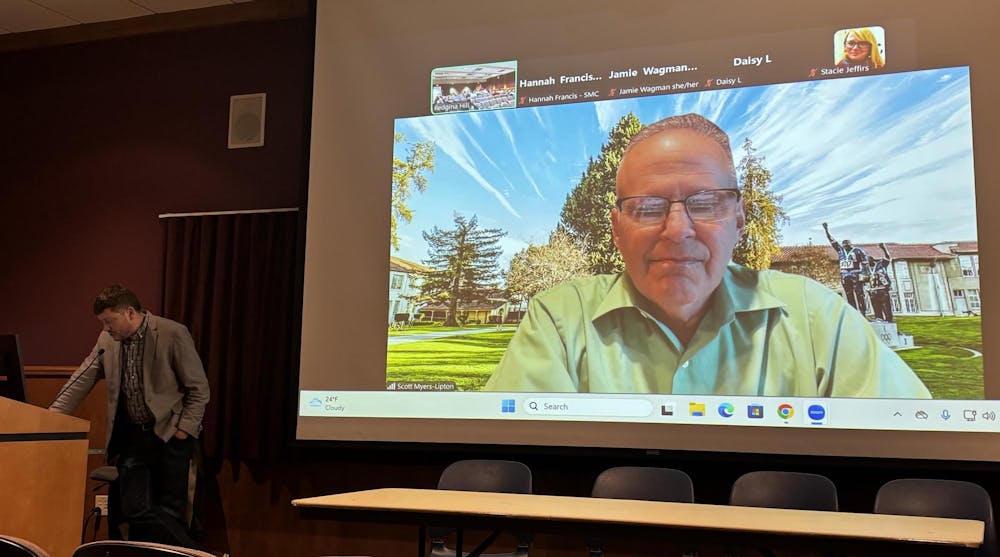On Wednesday afternoon in the Vander Vennet Theater, the justice studies department and the division for inclusion and equity co-sponsored a virtual lecture with Scott Myers-Lipton, professor emeritus at San Jose State University. In recognition of Dr. Martin Luther King Jr. Day, his lecture focused on “Democracy and Transformation through Education” and promoting his class curriculum, Teaching Social Action.
“Democracy in the United States is at a pivotal moment, facing significant challenges that leave many feeling disempowered,” Redgina Hill, vice president for inclusion and equity, wrote in an email, advertising the event. “While college courses often explore democracy and social change, few offer students the chance to engage in hands-on activism. Teaching Social Action bridges this gap by empowering students to take real-world action.”
Hill welcomed the opportunity for Myers-Lipton to speak on students engaging with and participating in social action, relating it to the efforts of college students during the Civil Rights Movement.
“Dr. King was lifted up as the leader for the civil rights movement, but at the same time, a lot of the grassroot work that took place was a lot of students. And so just having students understand how they enact change and the amount of change they can do is empowering,” Hill said. “[We] just wanted … our students to be able to see that even in the civil rights movement, people around your age were able to make a difference.”
Myers-Lipton began his presentation with explaining the origins of his social justice class, which was an idea that was inspired by former University President Fr. Theodore Hesburgh.
“I met who was president emeritus at the time, Theodore Hesburgh … and he was very important in the civil rights movement. And he had the idea, in 1987, to develop what he called Peace ROTC programs. [He thought that] if we have training for military service, we should have training for non-military or peace and justice or work in the colleges as well. And I got so excited about that idea … that I got a meeting with him. I set up a meeting, and I talked with him, and you know what he said to me? ‘I think it’s the right idea, but I don’t know how to do it, so you should do it, Scott,’ and so that put me on a 15-year quest,” Myers-Lipton said.
Myers-Lipton began teaching his social action class in 2006 at San Jose State University, using his prior experience in various advocacy movements to guide his curriculum content and teaching methods. The course itself enables students to find an issue within their community, create demands for authority to implement into policy and stage social actions to support the completion of their demands.
“You can’t just talk about democracy and change. To really understand it, you have to do it. It’s the only way to learn these things,” Myers-Lipton said. “Teaching Social Action meets the need of the lack of giving students the opportunity to do democracy by providing necessary training to faculty and staff … so they can help (students) have a direct experience with democracy and change."
Myers-Lipton has experienced substantial success with his class, reporting 17 successful campaigns, meaning at least one of the group’s demands were met, in the last 15 years. Some of his students’ successes include raising the minimum wage from $8 to $10, and later to $15, in the City of San Jose and constructing a 12-bed emergency housing for unsheltered students in addition to a dedicated center for basic needs at San Jose State University.
“All my students who've never done an action in their whole lives … they’re like, ‘Oh my God, this is gonna be the biggest failure of our lives.’ Every student feels that way. So it’s normal, it’s gonna pass. You're actually going to surprise yourself,” Myers-Lipton said. “And once you do one, you’re gonna catch the bug — I call it the democracy bug. And then you’re gonna want to do another, because it’s not only empowering, but it’s fun too.”
Andrew Pierce, associate professor of philosophy and director of the justice studies department, has embedded Myers-Lipton’s course into his Introduction to justice studies class, beginning this spring semester. Myers-Lipton said Pierce is one of 30 professors across the country to teach this class at a collegiate level. Next semester, Myers-Lipton reports the number will rise to 60.
Pierce said he originally learned about the Teaching Social Action course through a training institute sponsored by Myer-Lipton’s organization. He later decided to bring it to Saint Mary’s for his justice studies students.
“I went to one of the trainings a couple of years ago and learned more about it and got excited about it. And my justice studies class seemed like the right place to incorporate it,” Pierce said.
Pierce wants this class to become an important part of Saint Mary’s campus, empowering students to create change in their community and in the South Bend area.
“It would be nice for students to win their campaigns, but really for me, I’m hoping that they have a positive experience with organizing, with creating an action and with sort of feeling the power and energy that comes with doing that. That’s what's really important,” Pierce said.










